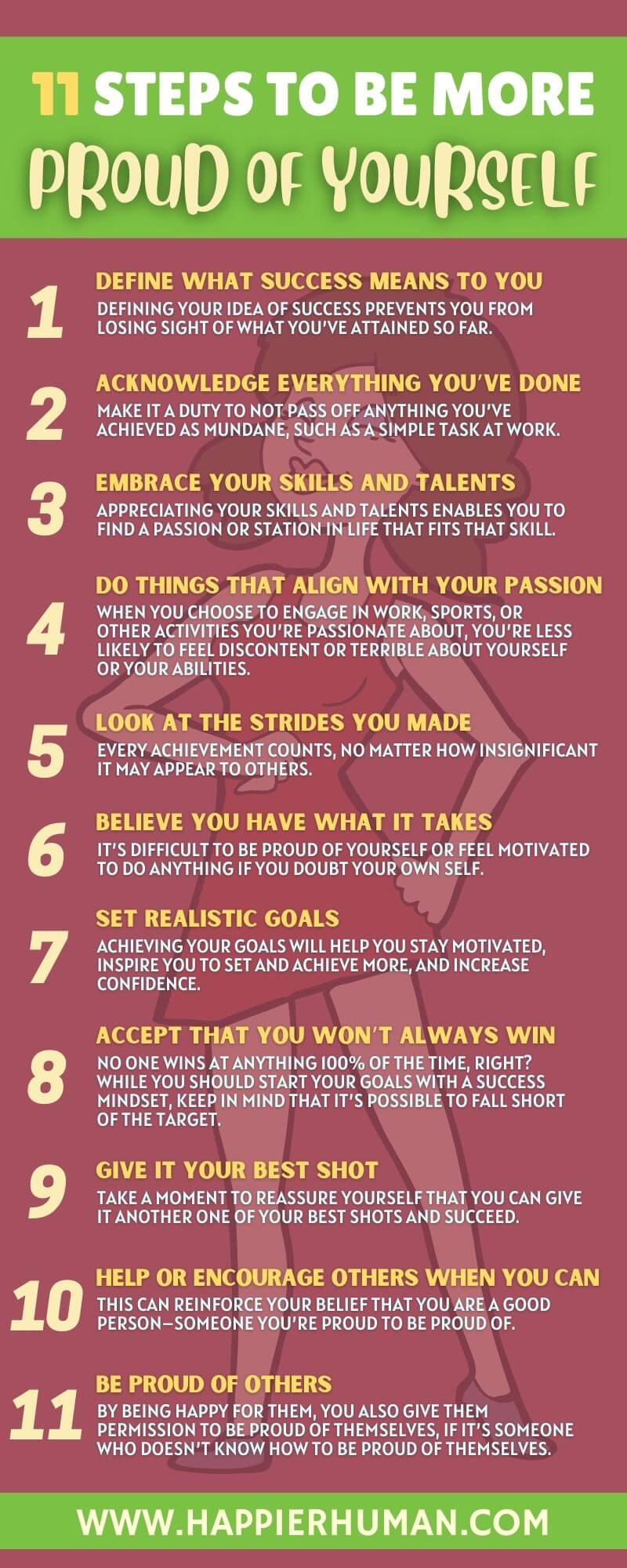There might be affiliate links on this page, which means we get a small commission of anything you buy. As an Amazon Associate we earn from qualifying purchases. Please do your own research before making any online purchase.
I think you'll agree that feeling proud of yourself is something we should all aim to practice. Yet, so many of us forget to praise ourselves… even when we clearly deserve it.
This may not necessarily mean you lack the self-confidence or self-esteem to acknowledge and bask in your achievements. Some people are just humble, modest or not that caught up in themselves.
Regardless of your personality, it's important to know how to be proud of yourself every day… because you're worth it!
In this article, I’ll explain what it means to be proud of yourself. We’ll talk about why it's so important and go over 11 steps to help you achieve it.
What Does It Mean to Be Proud of Yourself?
Being proud of yourself means being deeply pleased or satisfied with something you've done, own, or qualities you possess.
It also signals yourstrong sense of self-worthand ability to recognize thatyour achievements matter… just like all the other people you say you're proud of. But not in a way to put yourself on a pedestal over others or devalue them.
It's a type of humble pride.
In a study, The Self and Others in the Experience of Pride, the researchers measured pride as a positive self-conscious and social emotion, characterized by self-inflation rather than devaluing others.
Earlier in life, I wasn't aware of the positive effects of being proud of myself. As I grew in self-awareness, I began to be my own fan and motivator.
I decided not to wait for others to cheer me on… coming to the conclusion that not everyone will applaud me for the great things I've done. Or even the little things.
I truly believe that recognizing the value in things, such as your accomplishments, improvements in behaviors or how you conquered life challenges or setbacks, makes you feel better about yourself. It encourages self-improvement.
You're also able to show greater appreciation for where you were then and where you are now and measure the growth.
Benefits of Being Proud of Yourself
It's absolutely okay to take pride in yourself. You're not violating any rule book… at least not one I'm aware of. Besides, you'll enjoy the mental and physical benefits of celebrating your wins.
Being Proud of Yourself vs Being Conceited
At a glance, watching you search for ways to be proud of yourself may seem cocky or conceited to someone else. But the difference is in the intent.
You're simply looking for ways to celebrate yourself at every stage of growth and for every win, big and small. It shows that you are compassionate towards yourself the way you are with others when you tell them you're proud of them. Admiring yourself in a non-conceited way means to self-validate.
On the other hand, some people talk or boast about their accomplishments to get validation… to be seen as important and to fish for feedback to stroke their ego.

Those are considered selfish reasons to be proud of one's self. It's also conceited because there's a hidden agenda or motive behind letting everyone know what they have done, own, or can do.
All this in an attempt to inflate their self-image or self-importance to gain recognition. A person can only get a false sense of well-being from this because they are looking outside of themselves for validation.
Here's a YouTube Video, 10 Reasons to Be Proud of Yourself, which I find uplifting and worthy of sharing.
Common Reasons People Don't Feel Proud of Themselves
There are internal and external reasons why people may not feel proud of themselves.
Maybe your parent, caregiver, or someone you trusted put you down… minimized your achievements or said they weren't good enough although you knew you tried your best. The naysayers may have gone as far as to say, “I'm not proud of you.”
Another factor is negative self-talk, which is self-sabotaging. Some people talk themselves down, mainly because they were subconsciously programmed in childhood, not to trust or believe in themselves. Not to have pride.
Negative self-talk eats away at your sense of self-worth and self-esteem. If you don't feel good enough, you may doubt that anything you achieve is worth celebrating.
To increase your significance in your own eyes, you must learn to have pride in yourself. You must admire who you are, flaws and all. Love what you do. Appreciate where you are in life while seeking to improve. And be grateful for the strides you made. Here are some reasons why:
- You worked for it and deserve it.
- It puts a smile on your face.
- You appreciate your abilities more.
- It encourages you to push yourself.
- You believe in yourself more.
- You'll find it easier to set and achieve your goals.
- It makes others proud of you too.
- You'll find it easier to be proud of others.
- People's negative opinions about you are less likely to damage your self-esteem.
11 Steps to Being More Proud of Yourself
There are no hard-and-fast rules on how to be proud of yourself. With these steps, you'll learn how to appreciate yourself more… as well as the tiniest of accomplishments:
1. Define what success means to you
Success is a personal and subjective concept. Deciding what it means to you will reduce the chance of you feeling like a failure. Defining your idea of success prevents you from losing sight of what you've attained so far.
Do you feel successful when you have financial freedom, a good relationship, a great career, helped those in need, reached your health goals, or earned a degree?
Measuring your success is easier when you know what success means to you. You won't feel like a failure if your peers succeed in areas of their life that do not fit within your idea of personal success. You can be happy for them and still satisfied with your own progress.
2. Acknowledge everything you've done
No progress is too small to take notice of. You don't need to wait until you climbed Mount Everest or lost 20 pounds to throw a party. Honoring yourself every step of the way, even when you take one step forward, should be a big deal. Be grateful because that still counts as progress.
Think of those parents who are proud of themselves for helping their babies take the first step on their own. Not to mention the “yeah-I've-got-this” look on the baby's face after he takes the first step, for the first time, on his own. See “baby steps” as major wins!
In addition, make it a duty to not pass off anything you've achieved as mundane, such as a simple task at work. You never know, there may be a co-worker who is having a tough time trying to complete that same task.
3. Embrace your skills and talents
Another step you can take toward being more proud of yourself is embracing your abilities. Certain skills and talents are unique.
Not everyone can write a good book, run a marathon, or do gymnastics. Or it could be an ability to listen to people talk about their problems and show empathy.
If someone says, “You're a talented writer,” accept the compliment and embrace the fact that you have a unique skill. Appreciating your skills and talents enables you to find a passion or station in life that fits that skill.
You'll want to sharpen them because you take pride in having the knack for doing what you do. Besides, many people thrive when their work is their passion.
4. Do things that align with your passion
Have you ever heard people complain about their job or career or express unhappiness about it?
They may not be proud of what they do or their performance because of a lack of passion. When you choose to engage in work, sports, or other activities you're passionate about, you're less likely to feel discontent or terrible about yourself or your abilities.
Oprah Magazine puts it this way: “It's your passion for what you do that will give you the drive, commitment and energy necessary to create any amount of success and fulfillment you desire, and you'll have an extraordinary time while you do it.
5. Look at the strides you made
Knowing how to be proud of yourself involves seeing the big picture.
Every achievement counts, no matter how insignificant it may appear to others. Documenting your wins over time and comparing them gives you the big picture of your successes.

Examine where you were a year or two ago and measure it against where you are today. Any sign of improvement, in your lifestyle, the way you think or behave, your career, or your relationships, is proof that you moved upward or forward.
Seeing the big picture helps you to appreciate how far you've come. You may even find yourself smiling with a sense of pride.
6. Believe you have what it takes
Self-doubt can impact your level of success by causing you to second guess your abilities. It's difficult to be proud of yourself or feel motivated to do anything if you doubt your own self.
Even when you manage to achieve something, that little doubting Thomas in your head may whisper, “It's not good enough.”
Being self-assured makes it easier for you to say, “You know what, I did a fine job,” whether or not someone else thinks you could've done better.
Remember, taking pride in yourself is about how you see yourself, so trust and believe you have what it takes. This mindset will help you achieve your goals, too.
7. Set realistic goals
Setting goals you can achieve, also called “realist goals,” reduces the chance of frustration or doubting yourself or your abilities. Achieving your goals will help you stay motivated, inspire you to set and achieve more, and increase confidence.
According to an article published by Positive Psychology, there is a link between goal-hitting and improved self-confidence. Positive feedback from reaching your target also increases personal satisfaction.
8. Accept that you won't always win
No one wins at anything 100% of the time, right? While you should start your goals with a success mindset, keep in mind that it's possible to fall short of the target.
That's because achieving certain things may depend on external factors, such as input by others, or something out of your control.
Taking this mindset will prevent you from feeling disappointed when things don't go as expected. You're less likely to feel powerless or incapable and can still be proud of the things you were able to do within your control.
9. Give it your best shot
Were there times when you felt elated about something you conquered because you did your best? The outcome was probably not as important as the effort you put in. What matters is, you gave it your all. Do not let unfavorable results shake your confidence.
Accepting not only your wins but also your losses builds character. Take a moment to reassure yourself that you can give it another one of your best shots and succeed. Your sense of accomplishment can come from the process and not necessarily the outcome.
10. Help or encourage others when you can
You can engender positive self-pride when giving service to others, whether it's a helping hand, charitable donations, or a kind word.
Helping others serves as a reminder of your humanity and makes you feel like a good person. It's a sign of empathy and compassion when service is done for selfless reasons.

And honestly, it doesn't take much sometimes to make someone else's day better. In return, you may receive respect and appreciation from those you helped. This can reinforce your belief that you are a good person–someone you're proud to be proud of.
11. Be proud of others
Have you ever felt as proud of yourself for taking the time to congratulate others on a job well done? How about those times when you gave praise where it was due to someone who achieved something you wish you could? How did it make you feel?
It doesn't diminish you as an individual or make them see you as a lesser person.
If anything, you may gain their trust and respect from realizing that you can put aside your ego and be humble enough to celebrate them.
By being happy for them, you also give them permission to be proud of themselves, if it's someone who doesn't know how to be proud of themselves.
Final Thoughts on How to Be Proud of Yourself
On an emotional level, being proud of yourself is essentially an act of self-love.
This kind of self-pride is different from pride that focuses on inflating the self or the ego to devalue others.
You should not only be proud of the major strides you’ve taken… but every step forward is valuable and worthy of acknowledgment.
You are worth it!
If you enjoyed reading this article, you may also like, How to Love Yourself: 16 Ways to Forever Change Your Life’s Potential.
Finally, if you want to increase your happiness and life satisfaction, then watch this free video that details the 7-minute habit for planning your day to focus on what's important.


